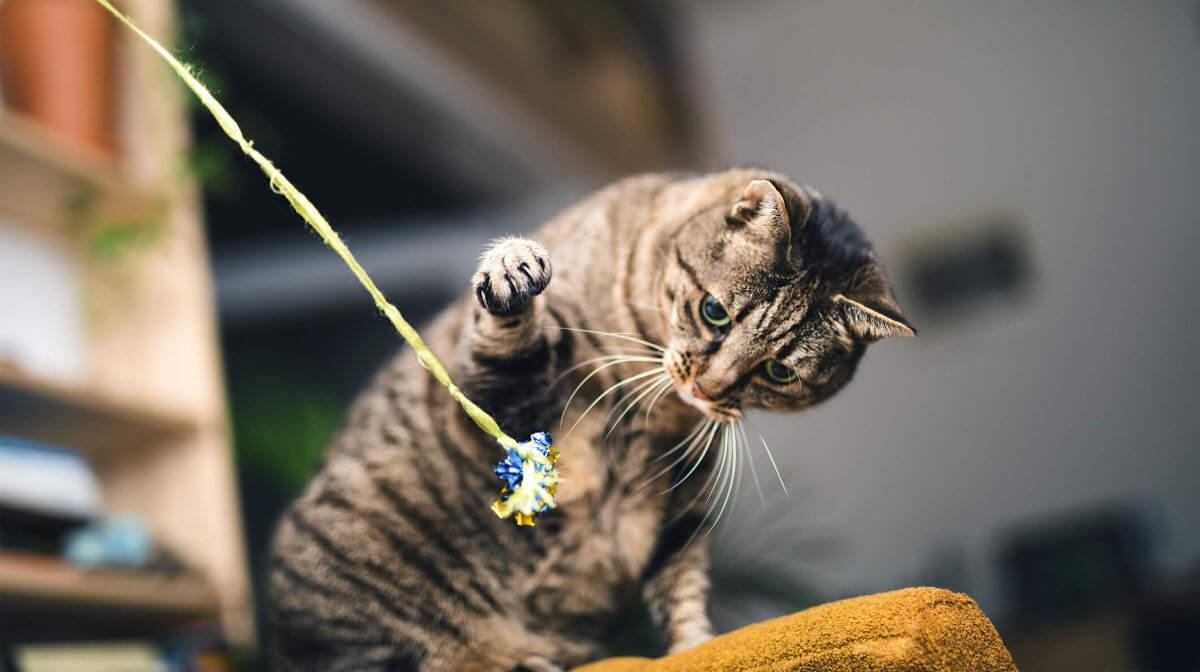
We’ve all been there – one minute we’re giving our cats a gentle stroke and listening to them purr, when suddenly – seemingly out of nowhere – they bite us. For a pet owner, this can be confusing. Here, James Wellbeloved explores some of the reasons behind these baffling cat bites and how you might be able to avoid them.
Why do cats bite?
Firstly, we must remember that cats are predators by nature. Their instinct is to use their teeth and claws for hunting and this informs their play. If your cat isn’t getting enough predatory play to satisfy this instinct, then they may attempt to use biting to engage you. Furthermore, a cat’s claws and teeth are their primary tools for exploring the world and are an innate part of their communication. So if your cat nips you, this is not necessarily an aggressive act as they cannot directly tell you in words. In fact, they may be using a bite to inform you of something else, such as hunger or pain. There is also a fine line for a cat between enjoyable interactions and annoying petting. A nip, while you are stroking them, can merely be their way of expressing that they aren’t enjoying something anymore. While this sudden cat bite may seem unjustified to you, to them it makes perfect sense.
Training kittens not to bite
It can be easy to disregard biting from kittens, as they are less painful and less likely to draw blood. Unfortunately, overlooking this behaviour at a young age can unintentionally reinforce the idea that biting is a positive behaviour and so you must still signal your dissatisfaction with them. It is crucial that you begin this training when they are kittens, as this is when behaviour is most easily taught and learned. As biting is a natural part of a cat’s behaviour, you cannot train them to stop entirely, but you can discourage it. You can do this by simply turning away from the kitten if they bite and stop playing with them. Although this can be difficult to do, it will make your cat less likely to bite as an adult.
Preventing adult cat biting
While it is harder to change an adult cat’s behaviour, you can train them in a way that deters biting. You must first ensure your cat has an outlet for their natural hunting instinct by providing them with toys. A laser pointer or catnip mouse will allow cats to express their desire to hunt, pounce and bite, without hurting you. This will make you a less frequent target of cat bites as they will have another channel for their more predatory instincts. If you choose to use a laser pointer, be sure to also use a toy. Chasing an object they cannot physically catch can be frustrating and stressful for an animal, so throwing a toy for them to catch can give them a much-needed reward for their hard work! On the occasion that you do still receive a cat bite, it is vital that you react in the correct way. You must remain calm and refrain from shouting at or striking your cat, as this will only scare and confuse them. Instead, you should move away from your cat, taking your hands out of biting range. If they are sitting on your lap, stand up slowly and move them off you.
Children and playing with cats
Cats can be great companions for children, but it is important that you teach your child how to play properly with the cat to ensure the safety of both. Firstly, you need to monitor the play for physical signs that your cat is getting annoyed. A cat’s fur standing on end or their ears being pressed back against their head can both indicate their displeasure. At this point, you can step in to remove your child and give your cat some space. You can learn more about understanding your cat’s behaviour here. Also, be sure to model positive behaviour for your child; play with the cat gently yourself, so that your child can learn from you how to behave. Giving positive reinforcement to your child when they mimic soft play will encourage them to continue in this safe way in future. Be careful when allowing your child to pick up your cat. Cats are independent creatures and do not always like such close and confining contact. If the cat is showing signs of distress at being carried around, make sure they are put down right away.
What to do if a cat bites you
There are certain precautions you ought to take if your measures to prevent cat bites fail. Cat bites are likely to introduce harmful bacteria into the body and can cause infection. If you are bitten by a cat, you should:
Flush out bacteria by squeezing the wound
Thoroughly wash the wound using soap and water
Dry with a clean cloth
Apply antibacterial cream
Dress with a sterile bandage
Go to a doctor, who will probably rewash and dress the wound. They may also administer a tetanus shot if yours is out of date and prescribe a course of antibiotics
With consistent training and rewards for good behaviour, you should be able to successfully discourage your cat from biting. If you are looking for help with training your cat, a vet or an expert in the field should be able to advise.

Related Articles








